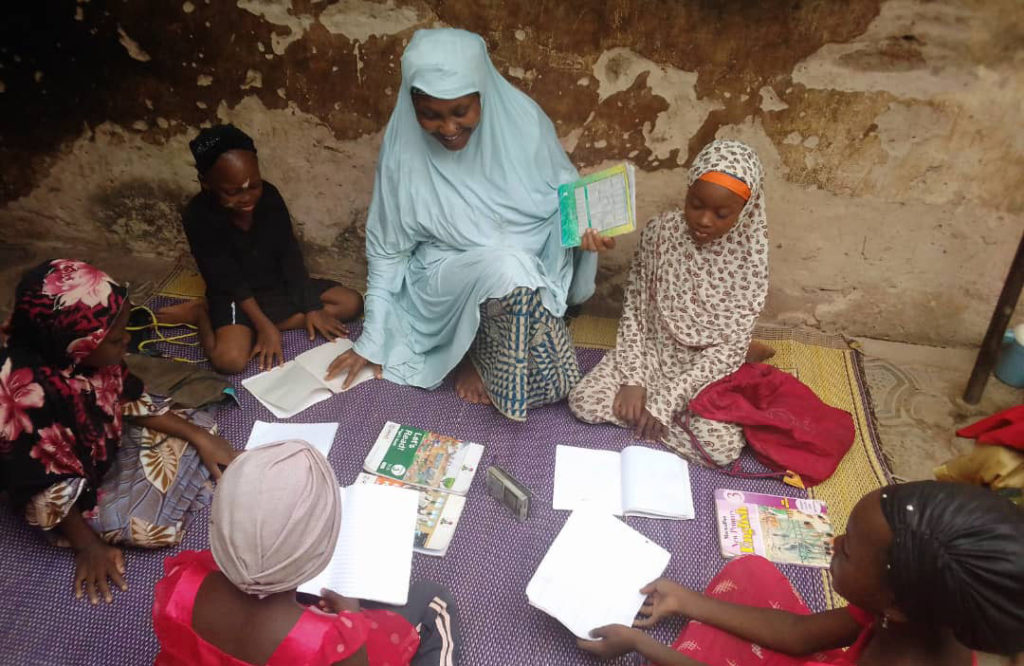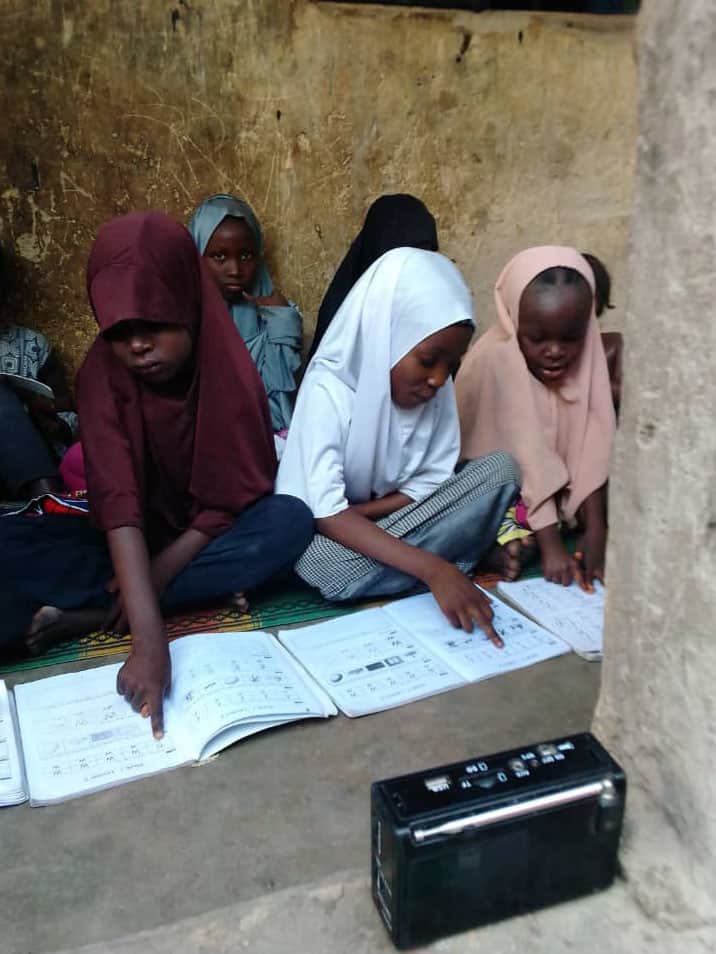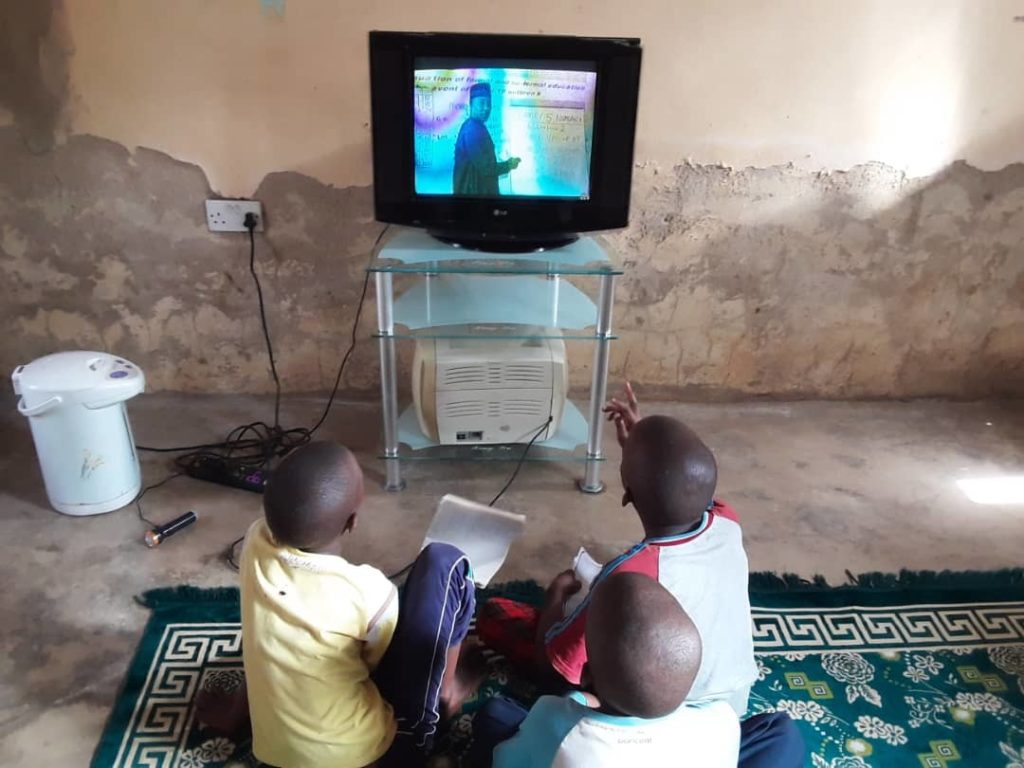Radio lessons in Northern Nigeria support reading during COVID-19 pandemic
by Janey Fugate
For more information and updates about Creative and our programs’ response to COVID-19, click here.
With classrooms shuttered because of the COVID-19 pandemic, students in Northern Nigeria are seeking much-needed alternate methods to continue their basic education.
The pandemic has left many parents and educators concerned that interruptions to education would undo much of the learning gains made in an already fragile environment, says Jordene Hale, Chief of Party of the USAID Northern Education Initiative Plus program (NEI Plus), which aims to strengthen quality education and improve children’s reading skills in Bauchi and Sokoto states.
“My fear is that kids will give up their education without that structure,” says Hale. “School is a habit. It’s hard to get that momentum going again.”
To keep students engaged in learning during difficult circumstances, educators are reaching students at home through radio and television.
USAID NEI Plus and UNICEF produced and aired a combined 670 lessons over radio and TV aimed at learners in grades 1-3. The lessons are in English and Hausa and follow the Let’s Read! (or Mu Karanta! in Hausa) early grade reading curriculum, which was introduced by NEI Plus. These lessons, which are being broadcast for several hours per day, are expected to reach a total of 600,000 students in Sokoto and Bauchi.
“We want to stem the learning loss by having families re-engage with the process of learning,” says Hale.

NEI Plus tapped into its broad network within the education system — including teachers, government representatives, religious leaders and families — to spread the word about the distance learning. Tailored messages were broadcasted on government-run radio networks and sent to more than 20,000 WhatsApp contacts to help ensure parents and children would tune in.
Radio campaigns are not new for the project. In 2017, NEI Plus successfully used radio programs to promote learning and reading among educators and parents in Hausa language. The radio skits used culturally relevant scenarios to help promote education. At the same time, the project contacted parents to engage them in their children’s learning and emphasize the importance of literacy, using voice messages to reach those who may be illiterate themselves. Some of the material developed for these programs is being repurposed to respond to the COVID-19 crisis.
Nurudeen Lawal, the Deputy Chief of Party for NEI Plus, believes the radio programs will put students at ease during the COVID-19 pandemic, which has also coincided with an outbreak of the viral illness Lassa fever.

“Education cannot wait for the crisis to end,” says Lawal. “Because part of resilience is that when learning continues despite the crisis situation, it tends to reduce the level of anxiety and stress in the children.”
Nurudeen Lawal
Lawal says the radio lessons can continue to serve kids and their families even after the crisis is over and may complement other learning initiatives.
Radio lessons in a vulnerable environment
In Northern Nigeria, 30 percent of children do not have access to basic education and often lack adequate parental support. Schools suffer from insufficient funds, among other challenges. Girls face even greater difficulties and have lower levels of enrollment and are more likely to drop out of school. These obstacles to learning have been made even greater by the pandemic, making NEI Plus’ response even more urgent.
“The broader social implications for a setback in education are scary,” says Hale, particularly without a clear timeline on when schools will be able to reopen.
Entering its fifth and final year, NEI Plus has made significant progress in bringing quality education to Nigerian students and was equipped to respond to the crisis.
“NEI Plus is well-positioned to serve children and communities in unusual and unpredictable circumstances. The team’s experience working in Nigerian formal and non-formal schools and with vulnerable children gives us a greater sense of urgency as we respond to the pandemic and prepare for the future,” says Semere Solomon, Senior Director of Creative’s Africa Regional Center.
A midline early grade reading assessment conducted by the project indicates improvement in most of the key reading skills for Hausa and English. NEI Plus has enabled more than 260,000 children to gain literacy, numeracy, and life skills through non-formal schools, and 20 percent have gone on to mainstream into formal schools.

Interactive Voice Response programs are next
With an eye to further offsetting the potential losses brought on by COVID-19, the NEI Plus team is also producing Interactive Voice Response (IVR) programs for television, radio and cell phones that focus on social-emotional learning. Designed for parents and teachers, the IVR messaging will teach interpersonal skills and how to recognize and appropriately deal with signs of stress that may be a result of the pandemic.
Lawal says that they are also beginning to think about structuring remedial classes for students to catch them back up on missed material before schools reopen as well as teacher trainings.

